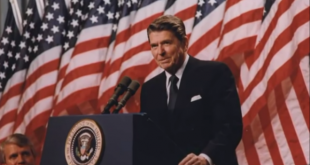Supreme Court Justice Anthony M. Kennedy learned and used a new word during the Supreme Court’s oral argument about Marriage. He said, “The word that keeps coming back to me in this case is millennia.”
He wasn’t talking about the new voting bloc of young people called the millennials. He was referring to the thousands of years in which the public has honored marriage as the union of a man and a woman.
“And suddenly,” as Justice Stephen G. Breyer said, “you want nine people outside the ballot box” to change that by judicial fiat. That sounds like somebody is seeking government by judicial supremacists instead of by “We the people” (as our Constitution says).
The verdict of history that extends even farther back than the U.S. Constitution is why Kennedy said “the word that keeps coming back to (him) in this case is millennia.” Chief Justice John G. Roberts Jr. added, “Every definition that I looked up, prior to about a dozen years ago, defined marriage as unity between a man and a woman as husband and wife.”
It was not only the longevity of the husband-wife definition of marriage that troubled the Justices but also its universality. Justice Samuel A. Alito Jr. pointed out that, “Until the end of the 20th century, there never was a nation or a culture that recognized marriage between two people of the same sex.”
Alito noted that in ancient Greece, for example, only opposite-sex couples could be married even though same-sex relationships were openly tolerated. That proves the definition of marriage is not borne of prejudice or “animus” against homosexuals.
The same is true of the non-Western societies of Asia, Africa and the Middle East. Incidentally, have you noticed that only Christian small business people have been harassed and sued for refusing to participate in same-sex marriages, even though our fast-growing immigrant populations of Muslims, Hindus and other faiths are also opposed to that concept?
The use of same-sex marriage to attack Christian businesses, but not businesses run by members of other religions, demonstrates what is really driving the demand for a new constitutional right to same-sex marriage. It is simply the latest attempt to destroy Christian institutions and discredit Christian beliefs.
The same-sex-marriage advocates like to say that as many as 37 states have already made same-sex marriage legal, and they use the argument of inevitability to pressure the rest of us to go along.
The truth is that only 11 of the 50 states authorized same-sex marriage by the legislative process, and only three of those were ratified by a vote of the people; the others were dictated by judges, who are now being asked to impose the same rule on the U.S. Territories of Guam and Puerto Rico.
The best precedent for what the Supreme Court should do about gay marriage is the assisted suicide case of 1997 known as Washington v. Glucksberg. At a time when assisted suicide was illegal in every state, a lawsuit asked the Supreme Court to rule that suicide with a doctor’s assistance is a form of individual liberty protected by the Fourteenth Amendment to the Constitution.
Although the Justices were as deeply divided on social issues then as they are today, the Court unanimously declined the invitation to create a new constitutional right. Then-Chief Justice Rehnquist wrote in his majority opinion that judges should limit their rulings to “fundamental rights and liberties which are, objectively, deeply rooted in this Nation’s history and tradition” — which assisted suicide, like same-sex marriage, clearly is not.
Two years ago, when the Supreme Court heard California’s Proposition 8 case, Justice Scalia famously asked gay marriage attorney Ted Olson, “When did it become unconstitutional to exclude homosexual couples from marriage? 1791? 1868 when the 14th Amendment was adopted?” After much hemming and hawing, Olson finally admitted, “I can’t answer that question.”
Echoing the gay advocates, Obama’s Solicitor General Donald Verrilli told the Supreme Court that “it is simply untenable … to wait until the majority decides that it is ready” for same-sex marriage. In other words, goodbye to government “of the people and by the people” and welcome to government by unelected judges.
Asking the Court to reject the will of the American people and impose a new rule that is not “objectively, deeply rooted in this Nation’s history and tradition” means, as Rehnquist warned in 1997, that our beloved Constitution would be “subtly transformed into the policy preferences of the members of this Court.”
COPYRIGHT 2015 CREATORS.COM
Photo credit: “USSupremeCourtWestFacade” by UpstateNYer – Own work. Licensed under CC BY-SA 3.0 via Wikimedia Commons.
 Phyllis Schlafly is a lawyer, conservative political analyst and author of 20 books. She is the co-author, with George Neumayr, of the New York Times Best-Seller titled “No Higher Power: Obama’s War on Religious Freedom.” She can be contacted by e-mail at phyllis@eagleforum.org.
Phyllis Schlafly is a lawyer, conservative political analyst and author of 20 books. She is the co-author, with George Neumayr, of the New York Times Best-Seller titled “No Higher Power: Obama’s War on Religious Freedom.” She can be contacted by e-mail at phyllis@eagleforum.org.
 Black Community News News and Commentary for Christians
Black Community News News and Commentary for Christians




And here’s an unintended consequence. If the Supreme Court rules that it is not the place of the government to redefine marriage, then that ruling may well carry down to the state level as well. Since they are focusing on “We the people”, that could make it so that state legislatures would also not be free to redefine marriage without putting it to the voters first. So in one stroke, every traditional marriage law passed by states would be immediately reinstated, including California’s Proposition 8, but any law passed by any state legislature that was not approved by the people of that state would simultaneously be struck down. That would leave only a handful of states that successfully redefined marriage at the ballot box which would be a massive defeat for the LGBT lobby. And since the issue can only be decided at the ballot box, nothing someone in the future from putting forward a new ballot initiative to reverse the previous ones in those states as well.